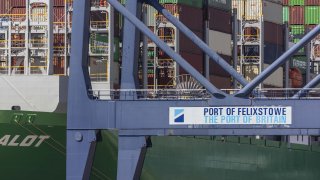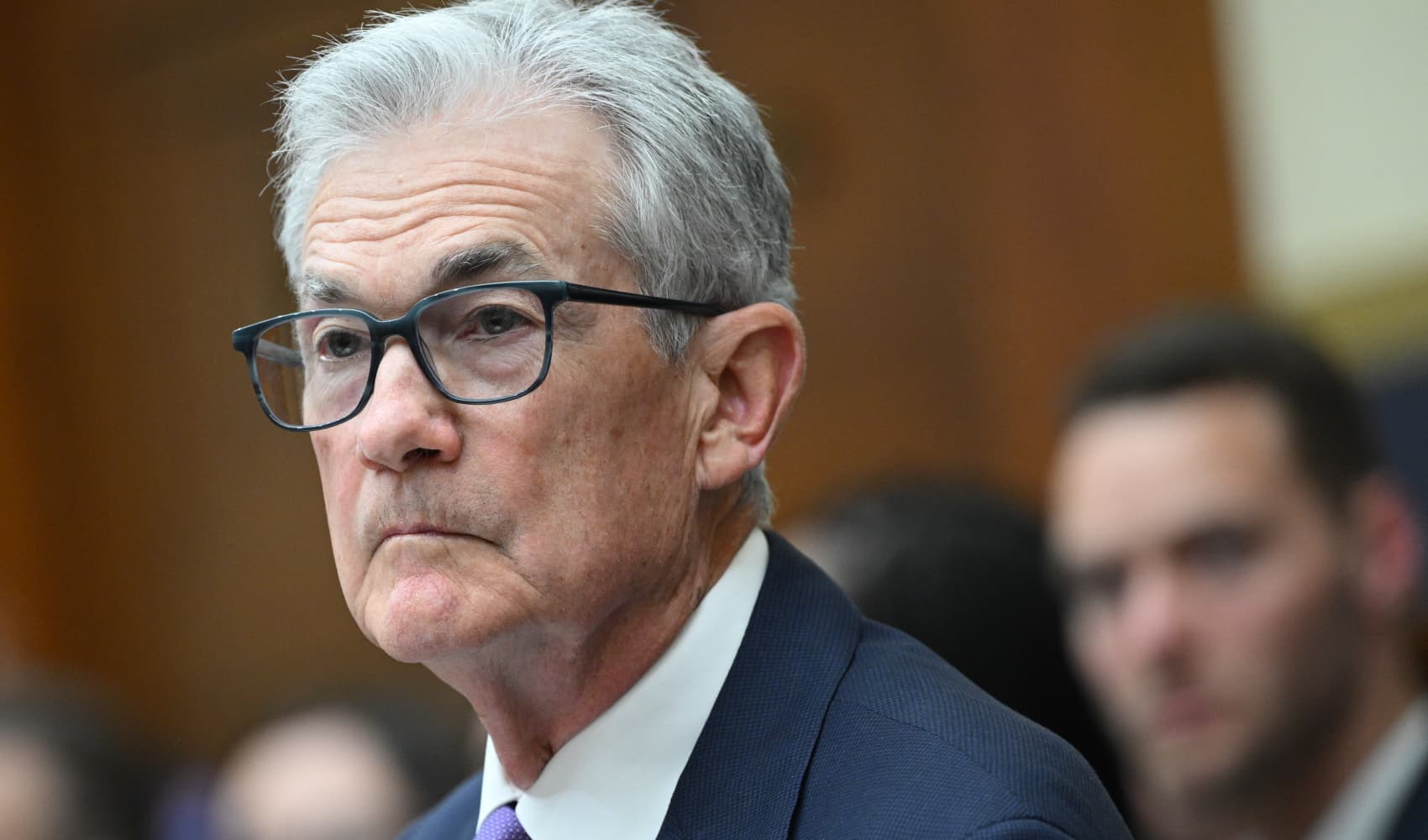
- MDS Transmodal tallies the total value of containers impacted by the eight-day strike is estimated at $4.7 billion
- 48% of all containers for the U.K .are processed at Felixstowe Port, and the strike could threaten the arrival of holiday products.
- Amazon, General Mills, Diageo, Kellogg, and Mars Foods are just some of the companies that use Felixstowe for imports.
The U.K.'s largest container port, Felixstowe, is essentially at a standstill after 1,900 members of the Unite union walked out for eight days over failed wage negotiations.
Based on trade data analysis by MDS Transmodal, the total value of containers impacted by the eight-day strike is estimated at roughly $4.7 billion.
Unite said members rejected the average 8% pay offer from the Felixstowe Dock and Railway Company because the wage offered was lower than the rate of inflation.
Get Connecticut local news, weather forecasts and entertainment stories to your inbox. Sign up for NBC Connecticut newsletters.
CK Hutchison Holding Ltd, which owns Port of Felixstowe, said in a statement on the port's website it was "disappointed" the walkout had gone ahead and called its offer of salary increases of on average 8% "fair". The company recorded a 75% increase in profits for 2021. In the first half of 2022, the company's profits declined due to lower volumes of export/import cargoes handled in the Hong Kong port.
Sharon Graham, general secretary of Unite, recently said C.K. Hutchison Holding Ltd prioritized shareholder profits over worker welfare.
"They can give Felixstowe workers a decent pay raise. It's clear both companies have prioritized delivering multimillion-pound profits and dividends rather than paying their workers a decent wage," she said.
Money Report
The CNBC Europe Supply Chain Heat map shows Felixstowe is now officially congested across the board.
Project44 shows the eight-day labor strike at the port of Felixstowe will have far-reaching consequences not only in maritime activity in the region but across Europe.
"The congestion is expected to worsen across Europe with an increase in blank (canceled) sailings and the container rollovers as a result of these cancellations will further impact the supply chain," said Josh Brazil, VP of supply chain insights for Project44. "European ports have floundered in their attempts to reconcile with their striking labor force, causing ports like Rotterdam, Hamburg, and Bremerhaven to struggle with accommodating vessels, leading to vessel queuing off their coast. The average cargo lead time for the TransAtlantic route has climbed to 27 days in July, close to its all-time high of 29 days at the start of the year."
Crane Worldwide Logistics told CNBC it will take around two months for this congestion to be cleared out.
"First talks with shipping lines have started to deviate containers," said Andreas Braun, Europe, Middle East, and Africa Ocean product director at Crane Worldwide Logistics. "However, there are few alternatives to move containers to other ports. Ocean carrier lines are already facing congestion and container mess in the other ports."
This could impact the arrival of products slated to be on store shelves for the holidays.
"It takes on average a week for containers to clear out of the port, and then a week to schedule a pickup by truck," said one logistics manager. "You are looking at the second half of November at the earliest to have products arrive at stores to be put on store shelves."
CNBC reviewed the bills of lading and companies that depend on products leaving that port. Some notable names listed were Amazon, General Mills, Loreal, GSK, Bacardi, Kellogg ,Mars Foods, Diageo, the company which owns Guinness, and Suntory, which owns Jim Beam.
Over 48% of the U.K.'s container trade is processed at the Port of Felixstowe.
Maersk, the second largest ocean carrier in the world, has omitted three vessel calls during the strike. In a statement Maersk said: "We expect the strike action to have a significant impact to the vessel line-up and are working along with vessel partners to mitigate risk and disruption as much as possible."
Antonella Teodoro, senior consultant at MDS Transmodal, told CNBC this is going to increase inflation on products being moved along this trade route.
"With retailers getting ready for the approaching festivities (Halloween and Christmas), the strike at the port of Felixstowe has the potential to disrupt the UK supply chain at a crucial time," said Teodoro. "Assuming that other Southern ports in the UK (Southampton and London Gateway) or continental ports have spare capacity to handle additional cargo, shipping lines could divert their ships. The re-routing, however, would not eliminate the risk of longer delivery times and higher costs, which can only worsen the UK economy already affected by high inflation. This goes beyond a 'logistics problem', as the increase in cost can be felt by the final consumers."
The impact on U.S. exports
The strike will also impact U.S. companies and industries that export to the U.K. According to detailed customs data analyzed by MDS Transmodal, a total of $66.7 million in US exports were processed in the Port of Felixstowe for the month of August 2021.
The timing of the arrival of goods for the holiday is also of concern.
Recent U.S. Customs data show Levi's and Black & Decker export to this port, along with Mallory Transportation which moves motorcycles, J.F. Hillebrand transporting Sonoma Wine, Ocean Spray, Nutrition and Biosciences which merged with IFF, and Brown Forman, the company that owns Jack Daniels. Becton Dickinson and Archer Daniels Midland also export their products to this port.
There is also a tremendous amount of lumber and agriculture that is exported and it does have a shelf life, like almonds, peanuts, walnuts, pistachios and cranberries.
According to OEM, other product categories which are processed through Felixstowe are furniture, computers and auto parts.
"The port strike in Felixstowe will interrupt the flow of USA/UK export and import freight," said Alan Baer, president of OL USA. "Cargo now enroute will need to be rerouted, creating delays and added expenses for everyone impacted. While alternative ports exist, they may not be able to cope with the added volume of vessels plus the need for landside logistics."
The strike at Felixstowe is the latest of a string of port strikes in Europe where workers are striking against inflation and the record profits the ports have made during the pandemic.
In Germany, negotiations on the collective agreements for port workers and the ports have remained to be inconclusive. The Federal Collective Bargaining Commission of the Verdi union is reviewing the port's offer today, Tuesday. If the union does not accept the offer and no compromise is met, the collective bargaining committee has already put a ballot vote on an "enforcement strike" in a leaflet sent to the union workers. The port workers could then strike again.
The ports in Germany have had a series of work stoppages and strikes which has created significant congestion. Ports in the Netherlands have also experienced congestion as trade was rerouted to the ports to avoid the German port congestion and the slowdown in separating out Russia-linked containers as a result of sanctions.
The pileup of containers in Germany and the Netherlands will take until the first quarter of 2023 if an agreement is made, according to Braun. If no agreement is made, the pile-up will continue.
Alternative shipping options for U.S. companies that import or export product out of Felixstowe is limited as a result of the neighboring port congestion. An additional challenge facing logistics managers is the low water levels on Germany's Rhine River. The levels are so low it is now prohibiting some empty vessels from sailing.
The CNBC Supply Chain Heat Map data providers are artificial intelligence and predictive analytics company Everstream Analytics; global freight booking platform Freightos, creator of the Freightos Baltic Dry Index; logistics provider OL USA; supply chain intelligence platform FreightWaves; supply chain platform Blume Global; third-party logistics provider Orient Star Group; marine analytics firm MarineTraffic; maritime visibility data company Project44; maritime transport data company MDS Transmodal UK; ocean and air freight rate benchmarking and market analytics platform Xeneta; leading provider of research and analysis Sea-Intelligence ApS; Crane Worldwide Logistics; DHL Global Forwarding; freight logistics provider Seko Logistics; and Planet, provider of global, daily satellite imagery and geospatial solutions.






